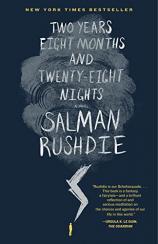Two Years Eight Months and Twenty-Eight Nights
Review
Two Years Eight Months and Twenty-Eight Nights
I have to start this review by admitting that TWO YEARS EIGHT MONTHS AND TWENTY-EIGHT NIGHTS was my first Salman Rushdie novel. For years I’ve heard terrific things about his mastery of magical realism and gift for beautiful sentences, and in these respects, his new book certainly does not disappoint. Set in the near future, the story begins after a horrific storm strikes New York City, ripping the veil between our world and the world of the spirits, and triggering a war between good and evil. The wordy title refers to the length of time of the war --- 1,001 nights, also a reference to classic Arab mythology.
From the very beginning of TWO YEARS EIGHT MONTHS AND TWENTY-EIGHT NIGHTS, Rushdie draws the reader in with lush, romantic prose describing the love affair between Dunia, a jinn princess, and Ibn Rushd, a doctor and man of reason. Rushdie explains that although jinni are known to be capricious, whimsical and even devilish, Dunia is drawn to intelligent men and renounces her jinn powers to live as a mortal with Ibn. Supernaturally lascivious, Dunia bears three sets of children, giving Ibn well over 20 children. Though he is certainly intelligent, Ibn remains ignorant of Dunia’s supernatural background, even as it becomes clear that his children have been born from a nonhuman mother. He ignores the children and eventually leaves Dunia for work, breaking her heart. Despite her pain, she vows to love him forever and forgive him when the time comes.
"Rushdie’s tongue-in-cheek references to current political, religious and social issues are subtle but profoundly thought-provoking.... For a first foray into Rushdie’s work, I found TWO YEARS EIGHT MONTHS AND TWENTY-EIGHT NIGHTS highly enjoyable, though definitely a commitment."
Over the years that follow, Dunia’s children spread out and have kids of their own, passing her mythical genes onto thousands of descendants. With time, Dunia and her gifts are forgotten, and her children’s magical powers go dormant. That is, of course, until a massive storm rips the thin veil separating our world from the world of the jinn. Overnight, unremarkable humans begin to find themselves capable of incredible feats of magic, from levitation to identifying corruption, and drawing superheroes that come to life. As these characters begin to deal with their newfound powers, Rushdie’s wit brings his magical creations to life, especially with Geronimo, a practical gardener who cannot stop levitating.
With several humans now exhibiting purely supernatural powers, it becomes clear that the jinn are back. Dunia, her human lover and his philosophical enemy reawaken, revisiting a centuries-old debate about science and faith. With a war brewing between the evil jinn and the good descendants of Dunia, their debate becomes physical, adding a new level to the war. As the air becomes tense, the humans prepare to fight the jinn who would seek to take control of humanity. With Dunia’s guidance, her children fight to save the world. Though the plot is, at its most skeletal, a simple story of superheroes fighting against evil, Rushdie adds such depth to his narrative that it feels new. With his wry humor, even the worst fights become funny, as humans and their supernatural counterparts fight and die in surprising ways.
Rushdie’s tongue-in-cheek references to current political, religious and social issues are subtle but profoundly thought-provoking. His characters, though inventive, highlight the war between religion and reason. Given his own political history, it is easy to see which side he falls on, and yet the book does not feel as political as one may expect, perhaps because of his fine mastery of satire. Speaking in the third person, Rushdie allows himself the space to discuss everything from philosophy to religion and even literature with an even-handed, affectionate teasing. At times this space can be a bit overwhelming, as the reader is being told not only a story, but also the history of that story as relayed to us 1,000 years into the future. The book could have benefited from a bit more editing, as Rushdie’s sentences can become dreadfully wordy and unclear. I often found myself rereading sentences several times over --- though this was not always upsetting, as he does some beautiful, truly impressive things with only 26 letters.
For a first foray into Rushdie’s work, I found TWO YEARS EIGHT MONTHS AND TWENTY-EIGHT NIGHTS highly enjoyable, though definitely a commitment.
Reviewed by Rebecca Munro on October 9, 2015
Two Years Eight Months and Twenty-Eight Nights
- Publication Date: July 12, 2016
- Genres: Fiction
- Paperback: 304 pages
- Publisher: Random House Trade Paperbacks
- ISBN-10: 0812988205
- ISBN-13: 9780812988208





